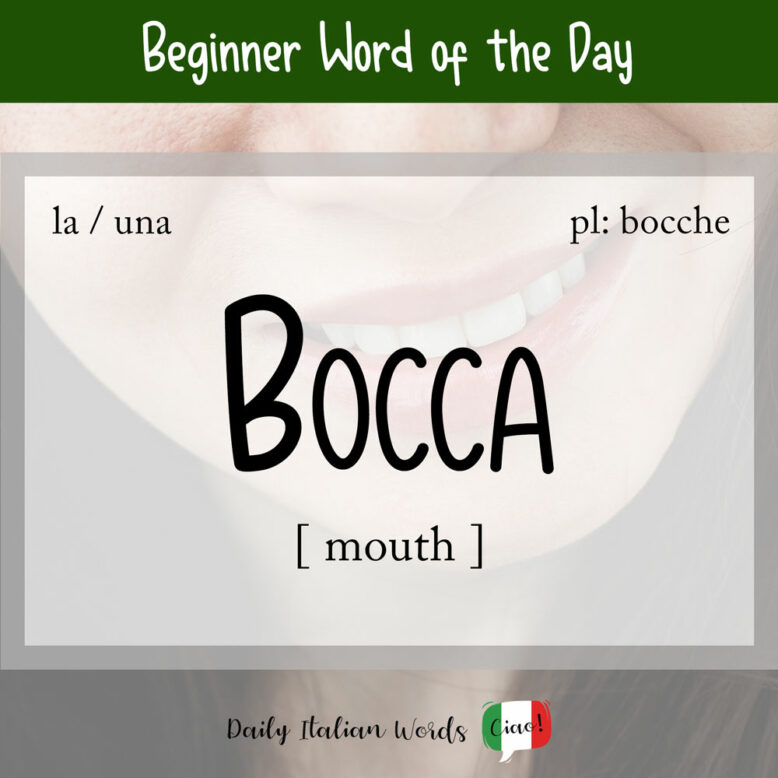The Italian word for mouth is bocca (feminine, plural: bocche), which comes from the Latin bucca meaning cheek.

Below are a few common verbs you’ll often see used with bocca:
- aprire la bocca = to open one’s mouth
- chiudere la bocca = to close one’s mouth
- coprire la bocca = to cover one’s mouth
- tenere la bocca chiusa = to keep one’s mouth shut
- mettere in bocca = to put in one’s mouth
- spalancare la bocca = to open one’s mouth wide
- baciare (qualcuno) in bocca = to kiss someone on the lips

Some people have una bocca grande (a large mouth), others have una bocca piccola (a small mouth) but most people have una bocca regolare (a normal mouth).
Ho messo la gomma da masticare in bocca.
I put the chewing gum in my mouth.
One rule we all learn as children is to never talk with la bocca piena (lit: a full mouth) – not only is it rude but you could end up choking and needing respirazione bocca a bocca (mouth-to-mouth resuscitation)!
In addition to describing the mouths of living creatures, bocca may also denote many different kinds of openings or entrances, just as in English. For example:
- la bocca del tunnel = the mouth of the tunnel
- la bocca del vulcano = the mouth of the volcano
- la bocca del vaso = the mouth of the vase
- la bocca del fiume = the mouth of the river
- la bocca dello stomaco = the pit of one’s stomach

From the word bocca we also get the words boccone and bocconcino. The former translates as a bite or mouthful whereas the latter means morsel or small snack. Bocconcino can also be used to refer to a delicacy or an attractive woman.
An expression that most learners of Italian pick up straight away is In bocca al lupo! (literally in the mouth of the wolf). Like the English idiom break a leg, it reflects a theatrical superstition that wishing a person good luck is actually bad luck. A related expression that means to be in trouble is andare / cadere in bocca al lupo (lit: to go / fall into the wolf’s mouth).
In bocca al lupo per l’esame domani!
Good luck on your exam tomorrow!
After telling someone a secret in English, we might instruct them to keep their lips sealed, whereas in Italian, they would say Acqua in bocca! (Water in the mouth!) since it is impossible to talk with your mouth full.

There are also other expressions linked to the mouth and talking such as:
- togliere le parole di bocca = to take the words out of someone’s mouth
- mettere le parole in bocca a qualcuno = to put words in someone’s mouth
- lasciarsi scappare / sfuggire qualcosa di bocca = to let something slip out
- strappare le parole di bocca = drag something out of somebody
- tappare la bocca (a qualcuno) = to shut (someone’s) mouth
- passare / correre di bocca in bocca = by word of mouth
Other idioms featuring ‘bocca’
In bocca al lupo and acqua in bocca are just two of the most well-known idiomatic expressions that use bocca, but as you can imagine, there are many more – so many, in fact, that this article would become an essay were I to list them all here! Instead we’ve chosen a few of our personal favourites to share with you.
Restare / rimanere a bocca aperta
Literal meaning: to be left open-mouthed
English translation: to be surprised, astonished
Restare / rimanere a bocca asciutta
Literal meaning: to be left with a dry mouth
English translation: to be left empty-handed, to be disappointed
Far venire l’acquolina in bocca
Literal meaning: to make drool come into your mouth
English translation: to make one’s mouth water, mouth-watering
Essere di bocca buona
Literal meaning: to have a good mouth
English translation: to be easily satisfied, to not be a fussy eater
Togliersi / levarsi il pane di bocca (per qualcuno)
Literal meaning: to take bread out of one’s mouth (for someone)
English translation: to do anything for someone, to give someone the shirt off your back
Togliere / levare il pane di bocca (a qualcuno)
Literal meaning: to take bread out of the mouth (of someone)
English translation: to take away a job or savings from someone
Rifarsi la bocca
Literal meaning: to remake the mouth
English translation: to get rid of a bad or unpleasant taste you have in your mouth by eating or drinking something nice
Heather Broster is a graduate with honours in linguistics from the University of Western Ontario. She is an aspiring polyglot, proficient in English and Italian, as well as Japanese, Welsh, and French to varying degrees of fluency. Originally from Toronto, Heather has resided in various countries, notably Italy for a period of six years. Her primary focus lies in the fields of language acquisition, education, and bilingual instruction.


